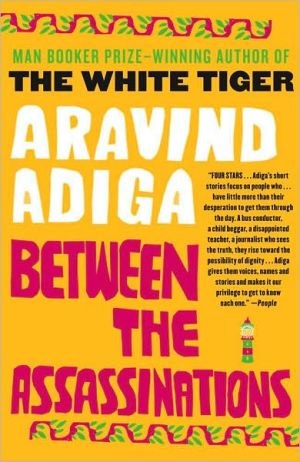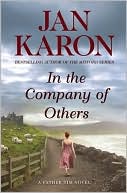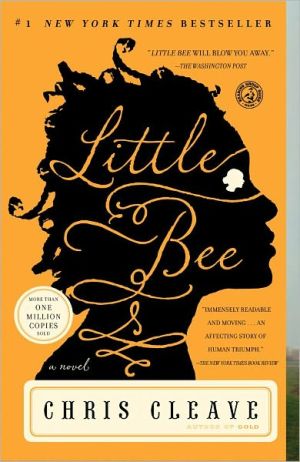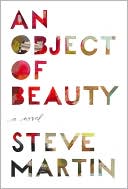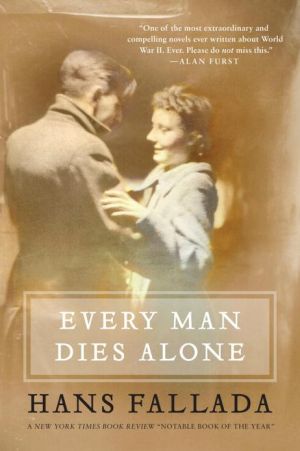Between the Assassinations
Welcome to Kittur, India. Of its 193,432 residents, only 89 declare themselves to be without religion or caste. And if the characters in Between the Assassinations are any indication, Kittur is an extraordinary crossroads between the brightest minds and the poorest morals, the up-and-coming and the downtrodden, and the poets and the prophets of an India that modern literature has rarely addressed.\ A series of sketches that together form a blinding, brilliant, and brave mosaic of Indian life...
Search in google:
Welcome to Kittur, India. It's on India's southwestern coast, bounded by the Arabian Sea to the west and the Kaliamma River to the south and east. It's blessed with rich soil and scenic beauty, and it's been around for centuries. Of its 193,432 residents, only 89 declare themselves to be without religion or caste. And if the characters in Between the Assassinations are any indication, Kittur is an extraordinary crossroads of the brightest minds and the poorest morals, the up-and-coming and the downtrodden, and the poets and the prophets of an India that modern literature has rarely addressed. A twelve-year-old boy named Ziauddin, a gofer at a tea shop near the railway station, is enticed into wrongdoing because a fair-skinned stranger treats him with dignity and warmth. George D'Souza, a mosquito-repellent sprayer, elevates himself to gardener and then chauffeur to the lovely, young Mrs. Gomes, and then loses it all when he attempts to be something more. A little girl's first act of love for her father is to beg on the street for money to support his drug habit. A factory owner is forced to choose between buying into underworld economics and blinding his staff or closing up shop. A privileged schoolboy, using his own ties to the Kittur underworld, sets off an explosive in a Jesuit-school classroom in protest against casteism. A childless couple takes refuge in a rapidly diminishing forest on the outskirts of town, feeding a group of "intimates" who visit only to mock them. And the loneliest member of the Marxist-Maoist Party of India falls in love with the one young woman, in the poorest part of town, whom he cannot afford to wed. Between the Assassinations showcases the most beloved aspects of Adiga's writing to brilliant effect: the class struggle rendered personal; the fury of the underdog and the fire of the iconoclast; and the prodigiously ambitious narrative talent that has earned Adiga acclaim around the world and comparisons to Gogol, Ellison, Kipling, and Palahniuk. In the words of The Guardian (London), "Between the Assassinations shows that Adiga...is one of the most important voices to emerge from India in recent years." A blinding, brilliant, and brave mosaic of Indian life as it is lived in a place called Kittur, Between the Assassinations, with all the humor, sympathy, and unflinching candor of The White Tiger, enlarges our understanding of the world we live in today.The Barnes & Noble ReviewIntertwining the stories of Aravind Adiga's second book, Between the Assassinations, a self-described "novel in stories," is the blandly anodyne voice of a travel guide writer introducing the visitor to Kittur, a city on the southwest Indian coast where the book is set. The cheerful pabulum of the travel guide's spiel works as an ironic counterpoint to the boiling class resentment at the forefront of the stories. "After a lunch of prawn curry and rice at the Bunder, you may want to visit the Lighthouse Hill and its vicinity," suggests our affable guide, but the person going to Lighthouse Hill in the accompanying story is a man arrested for having sold bootleg editions of The Satanic Verses and who consequently has his legs broken by the police. The stark juxtaposition between sunny fantasy and sordid reality is one of the few rhetorical tools that Adiga has in his kit, and he puts it to frequent use. But in this case the canny device also allows him to explain the dizzying demographics of Kittur between 1984 and 1991 -- that is, between the assassinations of Prime Ministers Indira and Rajiv Gandhi. We learn that nearly ten languages are spoken in Kittur, and that the population is further stratified among Brahmins, Hoykas (members of the so-called "backward caste"), Dalits (formerly called Untouchables), Sunni and Shiite Muslims, Catholics, and sundry other religions.
Day Two:\ Lighthouse Hill\ After a lunch of prawn curry and rice at the Bunder, you may want to visit the Lighthouse Hill and its vicinity. The famous lighthouse, built by the Portuguese and renovated by the British, is no longer in use. An old guard in a blue uniform sits at the foot of the lighthouse. If visitors are poorly dressed, or speak to him in Tulu or Kannada, he will say, "Can't you see it's closed?" If visitors are well dressed or speak English, he will say, "Welcome." He will take them into the lighthouse and up the spiral staircase to the top, which affords a spectacular view of the Arabian Sea. In recent years, the City Corporation has begun running a reading room inside the lighthouse; the collection includes Father Basil d'Essa, S.J.'s A Short History of Kittur. The Deshpremi Hemachandra Rao Park around the lighthouse is named in honor of the freedom fighter who hung a Congress tricolor from the lighthouse during British rule.\ It happens at least twice a year. The prisoner, handcuffs on his wrists, is striding toward the Lighthouse Hill police station with his head held high and a look of insolent boredom on his face, while, following him, almost scampering to catch up, are the two policemen holding a chain attached to the handcuffs. The odd part is that the man in handcuffs seems to be dragging along the policemen, like a fellow taking two monkeys out for a walk.\ In the past nine years, the man known as "Xerox" Ramakrishna has been arrested twenty-one times on the granite pavement in front of Deshpremi Hemachandra Rao Park for the sale, at discounted rates, of illegally photocopied or printed books to the students of St. Alfonso's College. A policeman comes in the morning, when Ramakrishna is sitting with his books spread out on a blue bedsheet; he places his lathi on the books and says, "Let's go, Xerox."\ The bookseller turns to his eleven-year-old daughter, Ritu, who sells books with him, and says, "Go home and be a good girl, dear." Then he holds his hands out for the cuffs.\ In jail, Xerox is unchained and put in a cell. Holding on to the bars, he regales the policemen with ingratiating stories. He may tell them a smutty tale about some college girl whom he saw that morning wearing blue jeans in the American style, or a new swear word in Tulu he has heard on the bus while going to Salt Market Village, or perhaps, if they are in the mood for longer entertainment, he will narrate to them, as he has done so many times before, the story of what his father did for a living all his life — taking the crap out of the houses of rich landlords, the traditional occupation of people of his caste. All day long, his old man would hang around the back wall of the landlord's house, waiting for the smell of human shit; as soon as he smelled that smell, he came up to the house and waited, with bent knees, like a wicketkeeper waits for the ball. (Xerox bent his knees and showed how.) Then, as soon as he heard the thud of the boom-box being shut, he had to pull out the chamber pot through a hole in the wall, empty it into the rosebushes, wipe it clean with his loincloth, and insert it back before the next person came to use the toilet. That was the job he did his whole life, can you believe it!\ The jailors will laugh.\ They bring Xerox samosas wrapped in paper; they offer him chai. They consider him a decent fellow. They let him out at midday; he bows low to them and says, "Thank you." Then Miguel D'Souza, the lawyer for the publishers and booksellers on Umbrella Street, will call the station and yell, "Have you let him off again? Doesn't the law of the land mean anything to you?" The inspector of the station, Ramesh, keeps the receiver at a distance from his ear and reads the newspaper, looking at the Bombay stock market quotes. That is all Ramesh really wants to do in life: read the stock market quotes.\ By late afternoon, Xerox is back at it. Photocopied or cheaply printed copies of Karl Marx, Mein Kampf, published books, and films and albums are arranged on the blue cloth spread out on the pavement on Lighthouse Hill, and little Ritu sits stiff backed, with her long unbroken nose and faint mustache, watching as the customers pick up the books and flip through them.\ "Put that back in place," she will say, when a customer has rejected a book. "Put it back exactly where you picked it up from."\ "Accounting for Entrance Exams?" one customer shouts at Xerox. "Advanced Obstetrics?" cries another.\ "The Joy of Sex?"\ "Mein Kampf?"\ "Lee Iacocca?"\ "What's your best price?" a young man asks, flipping through the book.\ "Seventy-five rupees."\ "Oh, you're raping me! It's too much."\ The young man walks away, turns around, comes back, and says, "What's your final best price? I have no time to waste."\ "Seventy-two rupees. Take it or leave it. I've got other customers."\ The books are photocopied, or sometimes printed, at an old printing press in Salt Market Village. Xerox loves being around the machinery. He strokes the photocopier; he adores the machine, the way it flashes like lightning as it works, the way it whirs and hums. He cannot read English, but he knows that English words have power, and that English books have an aura. He looks at the image of Adolf Hitler from the cover of Mein Kampf, and he feels his power. He looks at the face of Khalil Gibran, poetic and mysterious, and he feels the mystery and poetry. He looks at the face of Lee Iacocca, relaxed with his hands behind his head, and he feels relaxed. That's why he once told Inspector Ramesh, "I have no wish to make any trouble for you or for the publishers, sir; I just love books: I love making them, holding them, and selling them. My father took out shit for a living, sir; he couldn't even read or write. He'd be so proud if he could see that I make my living from books."\ Only one time has Xerox really been in trouble with the police. That was when someone called the station and said that Xerox was selling copies of Salman Rushdie's The Satanic Verses in violation of the laws of the Republic of India. This time when he was brought to the station in handcuffs there were no courtesies, no cups of chai.\ Ramesh slapped him.\ "Don't you know the book is banned, you son of a bald woman? You think you are going to start a riot among the Muslims? And get me and every other policeman here transferred to Salt Market Village?"\ "Forgive me," Xerox begged. "I had no idea that this was a banned book, really...I'm just the son of a man who took out shit, sir. He waited all day long for the boom-box to make a noise. I know my place, sir. I wouldn't dream of challenging you. It was just a mistake, sir. Forgive me, sir."\ D'Souza, the booksellers' lawyer, a small man with black oily hair and a neat mustache, heard what had happened and came to the station. He looked at the banned book — a massive paperback with an image of an angel on the front — and shook his head in disbelief.\ "That fucking untouchable's son, thinking he's going to photocopy The Satanic Verses. What balls."\ He sat at the inspector's desk and shouted at him, "I told you this would happen if you didn't punish him! You're responsible for all this."\ Ramesh glared at Xerox, who was lying penitently on a bed, as he had been ordered to do.\ "I don't think anyone saw him selling it. Things will be fine."\ To calm the lawyer down, Ramesh asked a constable to go fetch a bottle of Old Monk rum. The two of them talked for a while.\ Ramesh read passages from out of the book and said, "I don't get what the fuss is all about, really."\ "Muslims," D'Souza said, shaking his head. "Violent people. Violent."\ The bottle of Old Monk arrived. They drank it in half an hour, and the constable went to fetch another. In his cell, Xerox lay perfectly still, looking at the ceiling. The policeman and the lawyer went on drinking. D'Souza told Ramesh his frustrations, and the inspector told the lawyer his frustrations. One had wanted to be a pilot, soaring in the clouds and chasing stewardesses, and the other — he had never wanted anything but to dabble in the stock market. That was all.\ At midnight, Ramesh asked the lawyer, "Do you want to know a secret?" Stealthily, he walked the lawyer to the cell and showed him the secret. One of the bars of the cell could be removed. The policeman removed it, and swung it, and then put it back in place. "That's how the evidence is hidden," he said. "Not that that kind of thing happens often at this station, mind you — but that's how it is done, when it is done."\ The lawyer giggled. He loosened the bar, slung it over his shoulder, and said, "Don't I look like Hanuman now?"\ "Just like on TV," the policeman said.\ The lawyer asked that the cell door be opened, and it was. The two of them saw the sleeping prisoner lying on his cot, an arm over his face to keep out the jabbing light of the naked bulb above him. A sliver of naked skin was exposed beneath his cheap polyester shirt; a creeper of thick black hair, which looked to his two onlookers like an outgrowth from his groin, was just visible.\ "That fucking son of an untouchable. See him snoring."\ "His father took out the shit — and this fellow thinks he's going to dump shit on us!"\ "Selling The Satanic Verses. He'll sell it under my nose, will he?"\ "These people think they own India now. Don't they? They want all the jobs, and all the university degrees, and all the..."\ Ramesh pulled down the snoring man's trousers; he lifted the bar high up, while the lawyer said, "Do it like Hanuman does on TV!" Xerox woke up screaming. Ramesh handed the bar to D'Souza. The policeman and the lawyer took turns: they smashed the bar against Xerox's legs just at the knee joint, like the monkey god did on TV, and then they smashed the bar against Xerox's legs just below the knee joint, like the monkey god did on TV, and then they smashed it into Xerox's legs just above the knee joint, and then, laughing and kissing each other, the two staggered out, shouting for someone to lock thestation up behind them.\ Periodically through the night, when he woke up, Xerox resumed his screaming.\ In the morning, Ramesh came back, was told by a constable about Xerox, and said, "Shit, it wasn't a dream, then." He ordered the constables to take the man in the cell to the Havelock Henry District Hospital, and asked for a copy of the morning paper so he could check the stock market prices.\ The next week, Xerox arrived, noisily, because he was on crutches, at the police station, with his daughter behind him.\ "You can break my legs, but I can't stop selling books. I'm destined to do this, sir," he said. He grinned.\ Ramesh grinned too, but he avoided the man's eyes.\ "I'm going up the hill, sir," Xerox said, lifting up one of his crutches. "I'm going to sell the book."\ Ramesh and the other cops gathered around Xerox and his daughter and begged. Xerox wanted them to phone D'Souza, which they did. The lawyer came with his wig, along with two assistants, also in black gowns and wigs. When he heard why the policemen had summoned him, D'Souza burst into laughter.\ "This fellow is just teasing you," he told Ramesh. "He can't possibly go up the hill with his legs like that."\ D'Souza pointed a finger at the middle part of Xerox's body. "And if you do try to sell it, mind — it won't be just your legs that we break next time."\ A constable laughed.\ Xerox looked at Ramesh with his usual ingratiating smile. He bent low with folded palms and said, "So be it."\ D'Souza sat down to drink Old Monk rum with the policemen, and they settled into another game of cards. Ramesh said he had lost money on the market the past week; the lawyer sucked at his teeth and shook his head, and said that in a big city like Bombay everyone was a cheat or a liar or a thug.\ Xerox turned around on his crutches and walked out of the station. His daughter came behind him. They headed for the Lighthouse Hill. The climb took two hours and a half, and they stopped six times for Xerox to drink tea, or a glass of sugarcane juice. Then his daughter spread out the blue sheet in front of Deshpremi Hemachandra Rao Park, and Xerox lowered himself. He sat on the sheet, stuck his legs out slowly, and put a large paperback down next to him. His daughter sat down too, keeping watch over the book, her back stiff and upright. The book was banned throughout the Republic of India and it was the only thing that Xerox intended to sell that day: The Satanic Verses, by Salman Rushdie. Copyright © 2008 by Aravind Adiga
Arrivingin Kittur 1Day One: The Railway Station 3How the Town Is Laid Out 21Day One (Afternoon): The Bunder 23Day Two: Lighthouse Hill 41Day Two (Afternoon): St. Alfonso's Boys' High School and Junior College 49Day Two (Evening): Lighthouse Hill (The Foot of the Hill) 79Day Two (Evening): Market and Maidan 107The History of Kittur 143Day Three: Angel Talkies 145The Languages of Kittur 167Day Four: Umbrella Street 169Day Four (Afternoon): The Cool Water Well Junction 201Kittur: Basic Facts 217Day Five: Valencia (To the First Crossroads) 219Day Five (Evening): The Cathedral of Our Lady of Valencia 243Day Six: The Sultan's Battery 271Day Six (Evening): Bajpe 291Day Seven: Salt Market Village 309Chronology 337
\ Publishers WeeklyThis short story collection, teeming with life in the small Indian city of Kittur between the assassination of Indira Gandhi in 1984 and that of her son Rajiv in 1991, serves as a prelude to Adiga's Booker Prize-winning The White Tiger. Loosely based on a tourist itinerary, the stories meander through the lives of a motley array of hoykas and Brahmins, Muslims and Christians. We meet Xerox, the peddler of illegally copied books who doesn't mind having been arrested 21 times, as this seems a step up from his father's work as an excrement shoveler. Then there is Jayamma: the eighth of nine daughters, she is sent out to work because her father had only enough money to marry off six daughters. Her only comfort is getting high on DDT fumes and rubbing the buttocks of a tiny idol of baby Krishna. Adiga's India is a place of wildly disparate fortunes, where a 500-rupee meal at the Oberoi Hotel in Bombay scandalizes a construction worker who marvels at the sight of a 20-rupee note. It's a gruesome picture of existence, and the small epiphanies hit like bricks from heaven. (June)\ Copyright © Reed Business Information, a division of Reed Elsevier Inc. All rights reserved.\ \ \ \ \ Library JournalFrom the author of The White Tiger, which won the 2008 Man Booker Prize, comes this collection of stories set in Kittur, India, between the assassinations of Indira Gandhi in 1984 and Rajiv Ghandi in 1991. Adiga captures the lives of the poor and powerless, doomed to hopelessness and sometimes rage. In "Market and Maidan," for example, an orphan comes to the city, where he works his way up to become a bus conductor but then loses everything when he falls off a bus and suffers a head injury. In some of the tales, the bleakness is relieved by the power of human connections. Thus, in "St. Alfonso Boys' High School and Junior College," Shankara's wealth can't compensate for the humiliations of his mixed-caste status, so he explodes a bomb in a classroom in retaliation for a teacher's mistreatment. But during the ensuing investigation, he recognizes that the teacher, who stutters, is a kindred spirit. VERDICT A stunning work; highly recommended.—Evelyn Beck, Piedmont Tech. Coll., Greenwood, SC\ \ —Evelyn Beck\ \ \ Kirkus ReviewsAdiga follows up his Man Booker Prize-winning debut (The White Tiger, 2008) with a collection of interconnected stories about the village of Kittur in southwestern India. The title refers to the period between the assassinations of Indira Gandhi in 1984 and Rajiv Gandhi in 1991, though there isn't much evidence of chronological progression here. The outside world seldom intrudes on Kittur, yet the tensions of caste and the conflicts of religion course through the narrative, sparking comedy and tragedy-sometimes both at once. The text is structured as a week's walking tour of the village; italicized sections describing buildings and landmarks precede the stories of various characters. Among the protagonists are an ambitious delivery carrier, a workman who oversteps his bounds and a lower-caste schoolboy who sets off an explosion in chemistry class to avenge the mockery he has endured. One of the strongest pieces features a renowned journalist who has become disenchanted with his profession. "Even the writer of the truth should not know the truth entire," he thinks. "Every true word, upon being written, is like the full moon, and daily it wanes, and then passes entirely into obscurity. That is the way of all things." The often-poetic tone recalls fairy tales and folk parables, as poor people in particular come to terms with the way of all things, foremost among them that "the rich own the whole world." Toward the end, Adiga introduces a character who could be confused with his creator, a writer praised as a young man because he has "gone into the countryside, and seen life there, unlike 90 percent of our writers." Returning 25 years later, he falls in love with a much younger woman andrealizes how much of an outsider he is: "he had become the stock figure whom he had worked into several of his stories-the lecherous old Brahmin, preying on an innocent girl of a lower caste."These provocative tales suggest that fiction illuminates truths beyond the reach of journalism.\ \ \ \ \ The Barnes & Noble ReviewIntertwining the stories of Aravind Adiga's second book, Between the Assassinations, a self-described "novel in stories," is the blandly anodyne voice of a travel guide writer introducing the visitor to Kittur, a city on the southwest Indian coast where the book is set. The cheerful pabulum of the travel guide's spiel works as an ironic counterpoint to the boiling class resentment at the forefront of the stories. "After a lunch of prawn curry and rice at the Bunder, you may want to visit the Lighthouse Hill and its vicinity," suggests our affable guide, but the person going to Lighthouse Hill in the accompanying story is a man arrested for having sold bootleg editions of The Satanic Verses and who consequently has his legs broken by the police. \ The stark juxtaposition between sunny fantasy and sordid reality is one of the few rhetorical tools that Adiga has in his kit, and he puts it to frequent use. But in this case the canny device also allows him to explain the dizzying demographics of Kittur between 1984 and 1991 -- that is, between the assassinations of Prime Ministers Indira and Rajiv Gandhi. We learn that nearly ten languages are spoken in Kittur, and that the population is further stratified among Brahmins, Hoykas (members of the so-called "backward caste"), Dalits (formerly called Untouchables), Sunni and Shiite Muslims, Catholics, and sundry other religions.\ Adiga gives us this information and makes a point throughout his stories of representing the full array of these faiths, castes, and classes -- but then he does a striking thing. Rather than piece together a mosaic of a diverse city, he goes about reducing the distinctions to irrelevant labels. The supposed gulf between Hindus and Muslims? A journalist discovers that the riots between the two factions were instigated by the government in collusion with the mafia in a land grab for the looted property: "Muslim goons burned Muslim shops and Hindu goons burned Hindu shops. It was a real estate transaction masquerading as a religious riot." The underdog unity and political action of Hoykas against the traditional oppression of their caste? Pure stagecraft ginned up by a few politicians eager to secure the votes of the masses. The assumed exceptionalism of the Brahmin caste? Meaningless to the embittered housemaid Jayamma, who's stuck waiting on the spoiled son of a civil servant.\ The Kittur we discover in Between the Assassinations turns out to be altogether homogenous -- remorselessly so, because its binding features, and those overshadowing religion or caste, are greed and corruption.\ That these unsavory qualities are fixations of Adiga's will come as no surprise to anyone who read his crudely powerful debut, the 2008 Man-Booker Prize winner, The White Tiger. That novel seems at first glance little more than the half-deranged screed of a former chauffeur who kills his master and flees with 700,000 rupees of stolen money. Yet a full-throatedJ'accuse! emerges from the tirade -- against Western-introduced materialism, human exploitation, and a culture dictated by the raw principles of capitalism, in which there are only two true castes: "Men with Big Bellies, and Men with Small Bellies." Adiga's feat in The White Tiger is to make the rantings of a murderer seem unnervingly lucid, even persuasive.\ Nearly all the characters in Between the Assassinations have their own rants to deliver as well. In the weakest stories, the complaints are venal and small: Jayamma curses the "lower caste" she has to work beside, or a petulant student avenges himself against a hated teacher (a couple of these stories are set in a boarding school -- you sense that Adiga may have a grudge to exorcise).\ When the anger finds more focus, however, the outcries are as potent as they are pointed. The crusading journalist incredulously sums up the fundamental injustice of the legal system when he says, "An innocent man is behind bars, and a guilty man walks free. Everyone knows that this is so and not one has the courage to change it." In another strong story, Chennaya, an autorickshaw driver, is too low on the ladder to even have the luxury of voicing his protests out loud: "You have to attain a certain level of richness before you can complain about being poor."\ It's in these protests, whether vocal or internalized, that Adiga's penchant for stark juxtapositions makes a reappearance. As these characters engage in the full spectrum of corruption from petty grifting to political graft they also yearn to live more purely, with hope and idealism. A scene in which Chenayya defecates behind a bush provides a good example:\ He looked up and took a deep breath. The sky is clean, he thought. There is purity up there. He tore off a few leaves, wiped himself clean with them, then rubbed his left hand against the earth in a bid to neutralize the smell.\ Clearly, seekers of subtlety will be frustrated by Between the Assassinations. That title, a nod to Virginia Woolf's final novel, Between the Acts, is almost comically inappropriate given the chasm between the two styles of prose. Woolf is much like the bygone Indian poets Bharathi and Tagore, whom one of Adiga's characters invokes as hidden sanctuaries of unspoiled beauty. But Adiga himself belongs to the scruffier (but no less passionate) lineage of Zola, Dreiser, and Upton Sinclair -- the journalist-novelists. His writing is often ragged and repetitive, but it possesses a jackhammer force that makes it immediately arresting.\ Adiga also displays a mordant, even mocking, sense of humor, but some of the wild edge of The White Tiger is absent here, replaced by notes of dejection and ambivalence. Adiga is now confronting the fate of an entire city, and though its inhabitants may rail and scheme against its culture of amoral greed, most eventually succumb to the status quo. A conspicuous number of these stories end with characters falling asleep, closing their eyes to the rottenness of their surroundings rather than rebelling against it.\ I don't know how far Adiga can fruitfully go with this tone of resignation (indeed, he may have already put it aside: versions of these stories were written before The White Tiger), but it inspires his saddest and most affecting piece of writing to date, the final story of Between the Assassinations. Murali, an aging member of the dwindling Communist Party, helps a begging widow receive government welfare. The widow has a daughter she despairs of marrying off, and with whom Murali falls in love. The feeling revives in him the idealism of his youth, when he wanted to be a great writer like Maupassant and a great social reformer spreading literacy in the countryside. Yet when he goes to declare his intentions he discovers that because the widow now has money, she scoffs at the thought of marrying her daughter to a poor factotum in an absurd political party. Of course, Murali recognizes, it is not the Communists who are laughingstocks to the average Indian so much as all idealists:\ Marx had become mute. Dialectics had become Dust. So had Gandhi; so had Nehru. Out in the streets of Kittur, the young people were driving brand-new Suzuki cars, blaring pop music from the West; they were licking raspberry ice-cream cones with red tongues and wearing shiny metal watches.\ He realizes that just as he helped put the widow on the dole, he can also cut off her flow of money and turn her back to begging -- and back to seeking out a marriageable man who doesn't want a dowry. It might be the credo of this rough, bracing book: the acceptance of avarice is the beginning of wisdom. --Sam Sacks\ Sam Sacks is the fiction editor at Open Letters Monthly (http://www.openlettersmonthly.com).\ \ \
